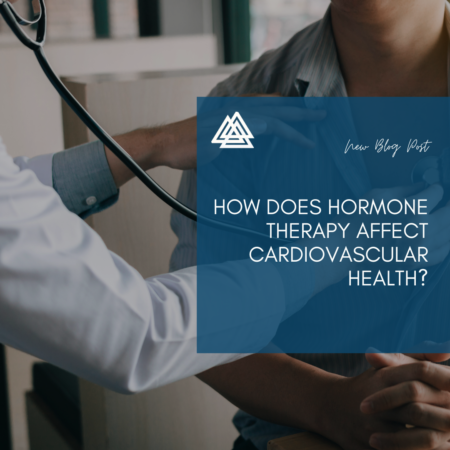 Hormone therapy (HT) has been a topic of much discussion and debate in the medical community, particularly regarding its impact on women’s health during and after menopause. While it is often prescribed to alleviate menopausal symptoms such as hot flashes and mood swings, its effects on cardiovascular health are complex and warrant careful consideration. In this blog post, we’ll explore how hormone therapy can influence cardiovascular health, the risks and benefits associated with its use, and what women should know when considering this treatment option.
Hormone therapy (HT) has been a topic of much discussion and debate in the medical community, particularly regarding its impact on women’s health during and after menopause. While it is often prescribed to alleviate menopausal symptoms such as hot flashes and mood swings, its effects on cardiovascular health are complex and warrant careful consideration. In this blog post, we’ll explore how hormone therapy can influence cardiovascular health, the risks and benefits associated with its use, and what women should know when considering this treatment option.
Understanding Hormone Therapy
Hormone therapy involves the administration of hormones—typically estrogen, progesterone, or a combination of both—to help manage symptoms associated with hormonal fluctuations, particularly during menopause. HT can take various forms, including:
- Estrogen-only therapy: Often prescribed for women who have had a hysterectomy.
- Combined hormone therapy: Involves both estrogen and progesterone, typically for women who still have their uterus.
- Bioidentical hormones: Compounds that are chemically identical to those produced by the human body, often used in alternative therapies.
Hormone Therapy and Cardiovascular Health
The relationship between hormone therapy and cardiovascular health is multifaceted. Several studies have investigated how HT can affect the risk of heart disease, stroke, and other cardiovascular conditions.
- The Timing Hypothesis
One of the most significant findings in recent research is the “timing hypothesis,” which suggests that the age at which a woman begins hormone therapy can influence its cardiovascular effects. According to this hypothesis:
- Early Initiation: Starting hormone therapy around the onset of menopause may have a protective effect on cardiovascular health. Research indicates that women who initiate HT during this window may experience a lower risk of heart disease compared to those who start later.
- Late Initiation: Conversely, women who begin hormone therapy several years after menopause may have an increased risk of cardiovascular events. This risk is thought to be related to the existing age-related changes in the cardiovascular system and the effects of prolonged estrogen deficiency.
- Impact on Cholesterol Levels
Hormone therapy can positively influence lipid profiles in women. Estrogen is known to:
- Increase HDL Cholesterol: Estrogen therapy has been shown to raise levels of high-density lipoprotein (HDL) cholesterol, often referred to as “good” cholesterol, which helps transport cholesterol to the liver for elimination.
- Lower LDL Cholesterol: Some studies suggest that HT may help lower low-density lipoprotein (LDL) cholesterol, or “bad” cholesterol, contributing to better overall cardiovascular health.
- Effects on Blood Pressure
The impact of hormone therapy on blood pressure is somewhat controversial. Some studies indicate that:
- Estrogen Can Lower Blood Pressure: Estrogen has vasodilatory effects, meaning it can help widen blood vessels, potentially leading to lower blood pressure.
- Risk of Hypertension: In some women, especially those who are older or have pre-existing conditions, hormone therapy may contribute to increased blood pressure. Regular monitoring is essential for women on HT.
- Risk of Thrombosis and Stroke
One of the more significant risks associated with hormone therapy is an increased likelihood of thromboembolic events, including deep vein thrombosis (DVT) and stroke. Factors influencing this risk include:
- Route of Administration: Oral hormone therapy has been associated with a higher risk of blood clots compared to transdermal (patches or gels) or vaginal formulations. This is because oral estrogen can affect the liver’s production of clotting factors.
- Individual Risk Factors: Women with a history of clotting disorders, smoking, obesity, or a family history of cardiovascular disease may face heightened risks when using hormone therapy.
Weighing the Benefits and Risks
When considering hormone therapy, women must weigh the potential benefits against the risks. Some potential benefits of hormone therapy include:
- Relief from menopausal symptoms such as hot flashes, night sweats, and mood swings.
- Improvement in bone density, reducing the risk of osteoporosis.
- Potential protective effects on cardiovascular health if initiated early in menopause.
However, the risks, particularly concerning cardiovascular health, should not be taken lightly. Women should have open discussions with their healthcare providers about their individual health history, risk factors, and goals for hormone therapy.
Conclusion
Hormone therapy can significantly impact cardiovascular health, with both potential benefits and risks. Understanding how hormone therapy affects the cardiovascular system is crucial for women considering this treatment option. The timing of initiation, method of administration, and individual risk factors all play essential roles in determining the outcomes of hormone therapy.
If you’re contemplating hormone therapy as part of your menopause management plan, consult with your healthcare provider to ensure you make informed decisions tailored to your unique health needs. By understanding the nuances of hormone therapy, you can take proactive steps toward maintaining your overall well-being during this transitional phase of life.
